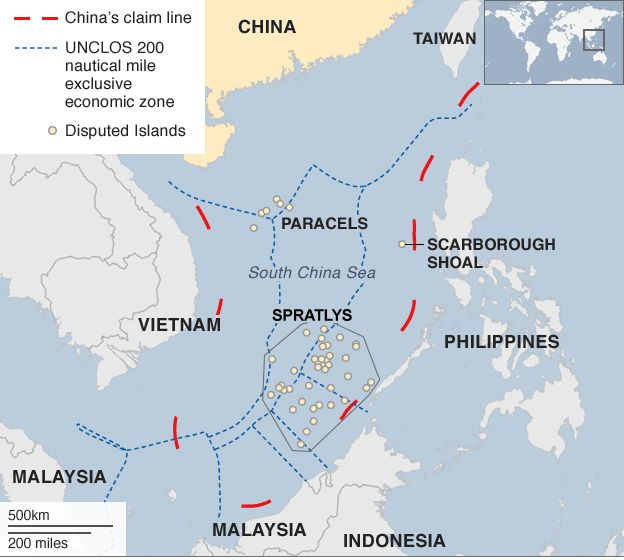International Relations
UNSC Meet on Maritime Security
- 13 Aug 2021
- 8 min read
Why in News
Recently, the United Nations Security Council (UNSC) has adopted the first-ever presidential statement on maritime security.
- India, as the UNSC president for August 2021, noted the threats to maritime safety and security and called upon the members to consider implementing the 2000 UN Convention against Transnational Organized Crime.
- All the permanent members of UNSC (US, China, Russia, UK and France) attended the Meet.
Key Points
- Statement on Maritime Security:
- Emphasized on safeguarding the legitimate uses of the oceans and security of coastal communities, affirming that international law — reflected in the 1982 United Nations Convention on the Law of the Sea, among other global instruments — provides the legal framework for combating these illicit activities.
- Called on Member States to implement the International Ship and Port Facility Security Code and Chapter XI-2 of the International Convention for the Safety of Life at Sea, and to work with the International Maritime Organization (IMO) to promote safe and secure shipping while ensuring freedom of navigation.
- Member States, by other terms, should also consider ratifying, acceding to and implementing the 2000 United Nations Convention against Transnational Organized Crime and the Protocols thereto.
Note
United Nations Convention on the Law of the Sea (UNCLOS)
- The ‘Law of the Sea Treaty’, formally known as the United Nations Convention on the Laws of the Sea (UNCLOS) was adopted in 1982 to establish jurisdictional limits over the ocean areas.
- The convention defines distance of 12 nautical miles from the baseline as Territorial Sea limit and a distance of 200 nautical miles distance as Exclusive Economic Zone limit.
- India became a signatory to the UNCLOS in 1982.
International Ship and Port Facility Security (ISPS) Code
- The ISPS Code is a set of measures to enhance the security of ships and port facilities. It was developed in response to the perceived threats to ships and port facilities after the 9/11 attacks.
- Chapter XI-2 of the International Convention for the Safety of Life at Sea enshrines the ISPS Code.
International Maritime Organization (IMO)
- IMO is a specialized agency of the United Nations (UN). It is a global standard-setting authority with responsibility to improve the safety and security of international shipping and prevention of marine and atmospheric pollution by ships.
- India joined the IMO in 1959. The IMO currently lists India as among the 10 states with the ‘largest interest in international seaborne trade’.
UN Convention against Transnational Organized Crime (UNTOC)
- UNTOC is also known as the Palermo Convention since it was adopted in Palermo in Italy in 2000, entered into force in 2003. India joined UNTOC in 2002.
- The idea behind having an international convention against organized crime was that if crimes could cross borders, so must law enforcement.
- India’s Stand: India has put forth five basic basic principles for maritime security.
- Free maritime trade sans barriers so as to establish legitimate trade.
- In this context, SAGAR (‘Security and Growth for all in the Region’) vision can be highlighted.
- Settlement of maritime disputes should be peaceful and on the basis of international law only.
- It was with this understanding, and maturity, that India resolved its maritime boundary with its neighbour Bangladesh.
- Responsible maritime connectivity should be encouraged.
- Making reference to China’s Belt and Road Initiative, India held that, while creating structures for “maritime connectivity”, countries should keep “financial sustainability” and absorption capacity of the host countries.
- Need to collectively combat maritime threats posed by non-state actors and natural calamities.
- Highlighting India’s role in the Indian Ocean has been that of a net security provider.
- Preserve the maritime environment and maritime resources.
- Highlighting increasing pollution from plastic waste and oil spills.
- Free maritime trade sans barriers so as to establish legitimate trade.
- US’ Stand:
- Conflict in the South China Sea or in any ocean would have serious global consequences for security and for commerce.
- It highlighted that China has been building military bases on artificial islands in the region also claimed by Brunei, Malaysia, the Philippines, Taiwan and Vietnam.
- The US also referred to the unanimous and legally binding decision five years ago by the arbitral tribunal constituted under the UNCLOS which China firmly rejected as unlawful.
- China’s Stand:
- China held that with the joint efforts of China and ASEAN countries, the situation in the South China Sea remains generally stable.
- Referring indirectly to the Quad (US, India, Japan, Australia), a few countries are pursuing exclusive regional strategies in the Asia Pacific region.
- This can create and intensify maritime conflicts, undermine the sovereignty and security interests of relevant countries, and weaken regional peace and stability.
- Further, China criticizes the US that it is not qualified to make irresponsible remarks on the issue of the South China Sea, because the US itself has not joined the UNCLOS.
- Russia’s Stand:
- Russia did not mention the South China Sea or the Indo-Pacific, and articulated a much nuanced position.
- It promotes strict adherence to key norms and principles of international law enshrined in the UN Charter, such as respect for sovereignty, non-intervention in the internal affairs and settling disputes through dialogue.
- UK’s Stand:
- The UK has a vision for a free, open and secure Indo-Pacific.
- In this context, the UK’s recent Integrated Review of Foreign, Security, Defence and Development policy set out the importance it attaches to the Indo-Pacific.
- France’s Stand:
- It held that the maritime domain has emerged as a theatre for a new generation of challenges and urged greater cooperation among the members of the UNSC to deal with the issue.
- Such as, combating climate change and its consequences on security, particularly in terms of natural disasters.





